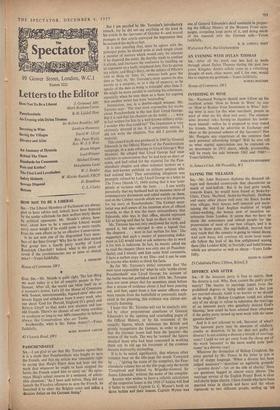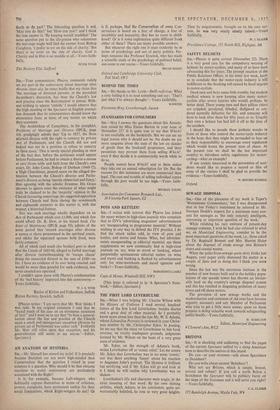DIVORCE AND AFTER
SIR,—If the innocent party is free to marry, then the divorce is real. Why, then, cannot the guilty party marry? The barrier to marriage (apart from the prohibited degrees or being under age) is that you are married already. Guilt is no barrier or we should all be 'single. If Bishop Creighton 'could not advise any of my clergy to refuse to solemnise the marriage of an innocent party who genuinely desired God's blessing,' how could he have advised them otherwise .if the guilty party turned up next week with the same genuine desire?
And is it not relevant to ask, Innocent of what? The innocent party may be innocent of adultery, cruelty or desertion. Is he (or she) not guilty of divorce? Is not seeking a divorce a breach of marriage vows? Could we not get away from the cheap use of the word 'innocent' to the more useful term 'peti- tioner' in a divorce case?
Whatever the distinction of Bishop Creighton, the piece quoted by Mr. Power in his letter to you is full of sloppy language. 'When a divorce has been judged necessary'—'desertion on equitable grounds' —'genuine desire'—'err on the side of charity.' Here are questions bogged in almost every phrase. The marriage service of the English Prayer Book is clear and clarity helps charity. I have friends who have been married twice in church and have said the whole rigmarole to two different people, ending up 'till
death us do part.' The interesting question is not, `May you do this?' but 'How can you?' and I think the true answer is, 'By keeping myself muddled.' The same question put to the clergyman who solemnises the marriage might well find the answer from Bishop Creighton, 'I prefer to err on the side of charity.' But there is no error on the side of charity. God is Charity and in Him is no muddle at all.—Yours faith- fully,















































 Previous page
Previous page